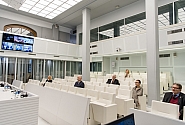
On Friday, 6 November, parliamentarians from Latvia, Estonia, and Lithuania took part in the digital 39th session of the Baltic Assembly (BA) and agreed on the cooperation priorities for 2021, emphasising the promotion of economic and social stability in the Baltic States as a matter of first concern.
In addition, MPs decided on a strong security and defence community, interconnected energy and transport networks, as well as safe societies and quality of life as BA priorities for the upcoming year.
As determined by parliamentarians, the main cooperation areas of the Baltic Assembly and the Baltic Council of Ministers for 2021 are to be regional security, including the Eastern Partnership and transatlantic relations, cooperation in the field of cybersecurity, connectivity, including regional energy and transport projects, and digital cooperation, climate change and environmental issues, as well as cooperation in culture and healthcare.
According to the Resolution adopted during the session, the beginning of the COVID-19 pandemic put the solidarity of the Baltic states to a rigorous test and revealed flaws in the trilateral cooperation. However, parliamentarians expressed their appreciation for the ability of the Baltic States to recognise the importance of cooperation and start timely exchange of information and joint coordination of emergency measures in the region.
“The cooperation of the Baltic States is crucial to solve the problems caused by the crisis. It is necessary to elaborate a coordinated approach for overcoming the crisis, as well as to envisage post-crisis measures aimed at reducing its negative impact on the economies, security, social sphere, and employment in the Baltic states,” underlined Jānis Vucāns, Head of the Latvian delegation to the Baltic Assembly.
During the session, MPs discussed the latest developments in and cooperation of the Baltic States, the unprecedented risks and challenges posed by the COVID-19 pandemic, as well as the measures to mitigate the impact of the COVID-19 crisis on the economy, social sector, and healthcare. Additionally, matters regarding defence and security cooperation, the establishment of a common electricity market, the implementation of the Rail Baltica project and other infrastructure projects, as well as joint education, research, and culture projects were considered during the session.
Next year, Lithuania will take over the BA presidency, and the 40th session of the Baltic Assembly is planned to take place on 4-5 November in Vilnius.
About the Baltic Assembly:
The Baltic Assembly is an inter-parliamentary cooperation organisation of Latvia, Estonia and Lithuania established on 8 November 1991. The Baltic Assembly consists of national delegations – 12 to 16 members from each country’s parliament. It is a coordinating and consultative organisation which has a right to express its opinion to the national parliaments and governments of the Baltic States, as well as the Baltic Council of Ministers, in the form of resolutions, decisions, declarations and recommendations; it also has a right to request the above-mentioned bodies to provide information on cross-border issues that are high on the Baltic Assembly’s agenda.
Saeima Press Service







